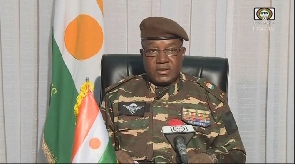 Abdourahmane Tchiani, leader of the Niger junta
Abdourahmane Tchiani, leader of the Niger junta
Niger’s de facto president, Abdourahamane Tchiani, wants to create a transitional government that would remain in power for “no longer than three years,” he said on state television, while warning against intervention from abroad.
Before that, he wants to hold a “comprehensive national dialogue” within 30 days and consult all Nigeriens, Tchiani said on Saturday evening.
Tchiani became Niger’s leader last month in a shock coup, when the presidential guard detained the president and seize power.
The national dialogue would provide the basis to create a new constitution, Tchiani said, underscoring that the decisions would be made “without outside interference.”
His comments came after the Economic Community of West Africa (ECOWAS) said its defence chiefs were drafting a plan to intervene if constitutional order is not restored.
A potential date for an intervention had been set, but was not mentioned publicly, the group said.
Niger’s new leaders responded by saying they had developed a defence strategy with “concrete measures” together with Mali and Burkina Faso if ECOWAS decides to “go to war.”
Mali and Burkina Faso are also ruled by the military following coups.
Following Niger’s coup on July 26, ECOWAS called for the reinstatement of the constitution and of Bazoum, who is under house arrest.
However, ECOWAS stressed that a peaceful solution should remain a priority and that military intervention would only be necessary if this failed.
Pope Francis also said on Sunday that he hopes for a peaceful solution to the crisis in Niger.
“I join the bishops’ appeal for peace in the country and stability in the Sahel region,” the Catholic Church leader said in St Peter’s Square in Rome after the Angelus prayer.
The Argentinean said he was following the events in Niger with concern. “In prayer, I accompany the efforts of the international community to find a peaceful solution as soon as possible for the good of all.”
Niger, a Sahel state with around 26 million inhabitants, is one of the poorest populations in the world. Up until the coup, it was one of the last democratic partners of the United States and Europe in the Sahel region on the southern edge of the Sahara.